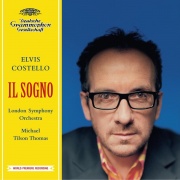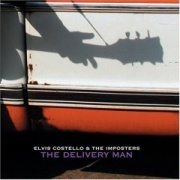London Observer, September 19, 2004: Difference between revisions
m (Zmuda moved page The Observer, September 19, 2004 to London Observer, September 19, 2004) |
(formatting / +browser +tags) |
||
| (2 intermediate revisions by the same user not shown) | |||
| Line 1: | Line 1: | ||
{{Bibliography header}} | {{Bibliography header}} | ||
{{:Bibliography index}} | {{:Bibliography index}} | ||
{{: | {{:London Observer index}} | ||
{{: | {{:UK & Ireland newspapers index}} | ||
{{Bibliography article header}} | {{Bibliography article header}} | ||
<center><h3>Elvis's double</h3></center> | <center><h3> Elvis's double </h3></center> | ||
---- | ---- | ||
<center> Molloy Woodcraft </center> | |||
<center> Molloy Woodcraft</center> | |||
---- | ---- | ||
'''Elvis Costello <br> | |||
The Delivery Man / Il Sogno | |||
{{Bibliography text}} | {{Bibliography text}} | ||
The diversity of Elvis Costello's output over the last decade or so is undeniable. His work with | The diversity of Elvis Costello's output over the last decade or so is undeniable. His work with the Brodsky Quartet, 1992's ''The Juliet Letters'', prompted him to learn musical notation, and the discovery evidently proved a springboard. Since then he has scored songs for Anne Sofie von Otter with the Brodsky, performed with people such as the guitarist Bill Frisell (at his own Meltdown in 1995 — don't look for the recording, it's heavy going), and collaborated on an album with Burt Bacharach; last year saw him release an album of piano ballads. All the while he has carried on a career as a rock star. And now this: the release in the same week of a new album with his touring band the Imposters, and a recording of his first full-length work for orchestra. How does he do it? | ||
In fact there's a little sleight of hand at play; the rock album | In fact there's a little sleight of hand at play; the rock album ''The Delivery Man'' was made this year but, while ''Il Sogno'' received its premiere earlier in the summer (the score was written for the Italian dance company Aterballetto's loose transposition of ''A{{nb}}Midsummer Night's Dream'') the recording, with the LSO and Michael Tilson Thomas, was made in the spring of 2002. All the same, releasing the two records in the same week is a deliberate move. In fact it looks like showing off. | ||
To take the ballet score first, Costello has, unsurprisingly, gone wider than the conventional canon for his noises and influences. The Romanian cimbalom figures prominently for a start, playing the recurring figure representing confusion. And he has chosen to evoke the different types of character in the work with different modes of music; jazz creeps in for fairies | To take the ballet score first, Costello has, unsurprisingly, gone wider than the conventional canon for his noises and influences. The Romanian cimbalom figures prominently for a start, playing the recurring figure representing confusion. And he has chosen to evoke the different types of character in the work with different modes of music; jazz creeps in for fairies — the stabbing strings of "The State of Affairs" are supplanted by music which reminds you that Costello's father, Ross MacManus, toured with the Joe Loss Orchestra, and later in "Oberon and Titania" John Harle and Chris Laurence are used to great effect on saxophone and double bass before the score drifts off into what almost sounds like a Seventies orchestral soundtrack. | ||
Not that Costello doesn't use the full palette at his disposal, and there are some great dramatic moments, as in the crashing strangeness and rage of | Not that Costello doesn't use the full palette at his disposal, and there are some great dramatic moments, as in the crashing strangeness and rage of "The Jealousy of Helena," or "Workers' Playtime," which follows, where Bottom's theme comes charging in like an ass, sparring with the other characters' motifs. Costello confesses to having been rushed to finish the score, but in fact, especially if you are following using the sleevenotes, the way he interweaves his themes as the action progresses is a revelation. Arching over all of it too is his sense of melody; you can almost hear him singing the main themes when they are restated in the closing "The Wedding," so much are they his. | ||
Recorded in Oxford, Mississippi, ''The Delivery Man'' is a rough and ready affair. Casting off the polished experimental quality of last year's ''When I Was Cruel'', it is instead stripped back and sometimes ramshackle. Opener "Button My Lip" gives you some idea of what is to follow, with huge shuffling drums from <!-- Chris --> Pete Thomas and a bustling bassline from Davey Faragher; it turns into a bizarre gumbo as Steve Nieve references snatches of familiar melody on the piano, turning into a cacophonous din behind Costello's yelled spite, and ending with odd delay on the vocal and messy guitar chords. "Country Darkness" is its antithesis; it's a slow country number, confusing at first because of the strange modulations in the piano, but blessed with a winning melody; Costello's voice is raw over lovely pedal steel. | |||
And so on. In fact country slowie follows messy rocker throughout the album, a conscious juxtaposition and one which works well. It's hard to pick favourites; nearly every track deserves a mention; | Lucinda Williams makes a guest appearance on "There's a Story in Your Voice," a standard country rocker, and it's one of the most bizarre performances you'll hear all year; she sounds genuinely drunk, blurting and slurring her words, a female, Deep South counterpart to Shane MacGowan. Then "Either Side of the Same Town" finds a pleasant cracked quality to Costello's voice on the high notes as he takes on his own close harmonies, sweet piano from Nieve and dirty tremelo guitar backing a mournful lament for ex-lovers trapped by a grid system that won't erase the memories. | ||
And so on. In fact country slowie follows messy rocker throughout the album, a conscious juxtaposition and one which works well. It's hard to pick favourites; nearly every track deserves a mention; "Needle Time" is among the best rockers, a fug of fuzzy low guitars and thick tom patterns that slows down to half-time for its chorus with some charm and fires up again with apparent abandon. | |||
There are also three duets with Emmylou Harris to consider. Her and Costello's vibratos mesh nicely on "Nothing Clings Like Ivy"; "Heart Shaped Bruise" gels less well, as if the vocals were recorded at different times; but the prize goes to the closing track "Scarlet Tide," written for the soundtrack to ''Cold Mountain'', a sad little ditty where the pair's voices intertwine perfectly over what sounds like a plucked ukulele, beauty absolute. Two very different bits of work, then, and both rather successful in their way: reason enough to show off? | |||
{{cx}} | |||
{{tags}}[[Il Sogno]] {{-}} [[London Symphony Orchestra]] {{-}} [[Michael Tilson Thomas]] {{-}} [[A{{nb}}Midsummer Night's Dream]] {{-}} [[The State Of Affairs]] {{-}} [[Oberon And Titania]] {{-}} [[John Harle]] {{-}} [[Chris Laurence]] {{-}} [[The Jealousy Of Helena]] {{-}} [[Workers' Playtime]] {{-}} [[The Face Of Bottom]] {{-}} [[The Wedding]] {{-}} [[The Brodsky Quartet|Brodsky Quartet]] {{-}} [[The Juliet Letters]] {{-}} [[Ross MacManus]] {{-}} [[Joe Loss Orchestra]] {{-}} [[Bill Frisell]] {{-}} [[Anne Sofie von Otter]] {{-}} [[For The Stars]] {{-}} [[Aterballetto]] <br> [[The Delivery Man]] {{-}} [[The Imposters]] {{-}} [[Pete Thomas]] {{-}} [[Davey Faragher]] {{-}} [[Steve Nieve]] {{-}} [[Emmylou Harris]] {{-}} [[Lucinda Williams]] {{-}} [[Country Darkness]] {{-}} [[Button My Lip]] {{-}} [[There's A Story In Your Voice]] {{-}} [[Either Side Of The Same Town]] {{-}} [[Needle Time]] {{-}} [[Nothing Clings Like Ivy]] {{-}} [[Heart Shaped Bruise]] {{-}} [[The Scarlet Tide]] {{-}} [[Cold Mountain: Music From The Miramax Motion Picture|Cold Mountain]] {{-}} [[Shane MacGowan]] {{-}} [[When I Was Cruel]] | |||
{{cx}} | {{cx}} | ||
| Line 34: | Line 36: | ||
{{Bibliography notes}} | {{Bibliography notes}} | ||
{{Bibliography next | |||
|prev = London Observer, September 2004 | |||
|next = London Observer, October 10, 2004 | |||
}} | |||
'''The Observer, September 19, 2004 | '''The Observer, September 19, 2004 | ||
---- | ---- | ||
[[Molloy Woodcraft]] reviews [[ | [[Molloy Woodcraft]] reviews ''[[Il Sogno]]'' and ''[[The Delivery Man]]''. | ||
{{Bibliography | {{Bibliography images}} | ||
[[image:Il Sogno album cover.jpg|180px|border|link=Il Sogno]] | |||
[[image:The Delivery Man album cover.jpg|180px|border|link=The Delivery Man]] | |||
{{Bibliography notes footer}} | {{Bibliography notes footer}} | ||
| Line 46: | Line 57: | ||
==External links== | ==External links== | ||
*[http://www.theguardian.com/music/2004/sep/19/popandrock.elviscostello TheGuardian.com] | *[http://www.theguardian.com/music/2004/sep/19/popandrock.elviscostello TheGuardian.com] | ||
*[http://www.theguardian.com/profile/molloywoodcraft Molloy Woodcraft] | *[http://www.theguardian.com/profile/molloywoodcraft TheGuardian.com: Molloy Woodcraft] | ||
*[http://en.wikipedia.org/wiki/The_Observer Wikipedia:The Observer] | *[http://en.wikipedia.org/wiki/The_Observer Wikipedia: The Observer] | ||
{{DEFAULTSORT:Observer 2004-09-19}} | {{DEFAULTSORT:London Observer 2004-09-19}} | ||
[[Category:Bibliography]] | [[Category:Bibliography]] | ||
[[Category:Bibliography 2004 | [[Category:Bibliography 2004]] | ||
[[Category: | [[Category:London Observer| London Observer 2004-09-19]] | ||
[[Category:Newspaper articles | [[Category:Newspaper articles]] | ||
[[Category:Album reviews | [[Category:Album reviews]] | ||
[[Category: | [[Category:Il Sogno reviews]] | ||
[[Category: | [[Category:The Delivery Man reviews]] | ||
Latest revision as of 21:40, 21 March 2021
|

